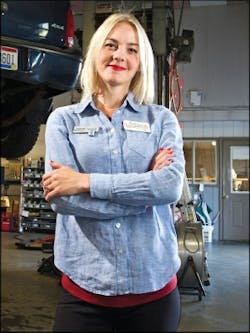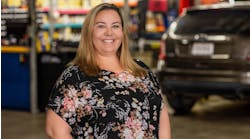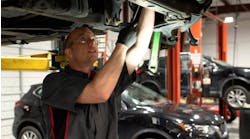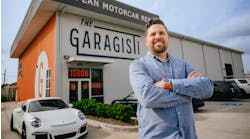Although Sarah Kennedy grew up spending every day after school in her father’s shop, Auto Emporium Inc. in Hilliard, Ohio, taking over the business was never part of her plan. But after graduating college with an English degree in 2008, she decided to start the transition of taking over the daily operations at the shop.
What she discovered was not only a passion for car repair, but a knack for using her English degree to create a communication flow that extends to every aspect of the shop.
I think that a lot of shop owners may make things complicated for themselves. Customers can be very emotional when it comes to car repair and owners have a very hard time not absorbing that. A lot of what a customer mistakes as bad car repair is simply poor communication: The customer had questions that weren’t answered; they felt things were hidden from them; the person talking to them was gruff and rude; the person felt their car was dirty when they got into it and nobody acknowledged it when they mentioned it. You can fix a car so well, but if you miscommunicate with the customer, they will never come back.
I am the first one here in the morning and I start up the computers, make coffee, check the voicemails and emails. The whole team arrives between 7:30 and 7:45 a.m. each day and I go over the schedule with the shop foreman. Then the rush of the day begins; the phone starts ringing off the hook, the customers start coming in and you go with the flow.
I try to spend a significant amount of time with each customer, from the time they call to schedule to the time we hand them their keys back. We’re a relationship-based business. We’re not order-takers, so we have to spend time with people in order for them to understand who we are and why they can trust us. At our shop, we believe in educating our customers. When you do that in a clear, concise and friendly way—when somebody understands what the part is, what it does and why it’s broken—then the cost of the repair is a natural part of the conversation.
My dad started the shop in the mid-’80s, and I used to come to the shop after school every day. When I was in high school, I started helping the service writer and that led into doing estimates for our service manager and selling other work.
When I went to college at Ohio State, I started as a business major before switching to English. I really thought I wasn’t going to be a part of the company, but at the end of my senior year, my dad’s father became very ill and my dad needed a trustworthy and experienced staff member right off the bat to fill his shoes.
I started working here and I found this passion for helping people get their cars fixed. As it turns out, I use my English degree every day. Part of an English major’s job is to take an idea and either argue for or against it, and also to take complicated world issues and talk about them in a way that creates an interesting conversation. Cars are obviously extremely complicated machines and these machines just happen to be driven by people who might not understand how complicated they are.
The English degree has really helped me explain complicated vehicle systems in a way that the person who’s getting into the car every day can understand what’s wrong, how it should work and how it can be fixed. When you combine that education with the price tag, a lot of people are totally okay with spending money.
I have that conversation with the customer in all different ways. If I’m doing it over the phone, the conversation may go something like this: “If you can imagine a transmission pan, it’s bolted to the bottom of the transmission and holds all the fluid when your car is off. Because it’s a piece of metal that requires bolts attached to the bottom of the transmission, two pieces of metal might leak when you put them together. So there has to be something in between the two pieces of metal to prevent fluid from leaking. We call that a transmission pan gasket and that’s what’s leaking on your car. This is how much it costs to fix. When you take off that pan, the old transmission fluid comes with it, so it’s the perfect opportunity to put fresh fluid back in.” After having that conversation, the customer goes, “That makes sense.”
If the customer’s car is on the rack, I go out with them and show them exactly what’s wrong. But I’ve also noticed that doing that can overwhelm the customer because suddenly there’s this giant car over their heads with so many parts and pieces in it. I prefer to use pictures and diagrams that are clean and simple and zoom in really closely on the issue. But if there is some doubt or discomfort with the customer with what’s really going on, we’re always happy to bring them out to their car. The car is a machine; it either has a condition or it doesn’t. When you have emotional doubt in something, it’s easiest to squash that by proving that car has that condition.
After I speak with the customer and explain the repairs, I also do all of the parts ordering for the shop. That’s another area where my English degree has really helped. Primarily when I need something very quickly and I have to make a phone call, I can ask politely and quickly what I need and when I need it. There’s no confusion about what the part looks like, if it’s the right part or not. I’m able to very clearly explain what I need and I’ve found it’s helped build trust with the suppliers.
Coming from an academic side of things, it was really important to me not to shy away from the technical. Everybody has had that service writer who has a hard time getting out of their chair, but you just can’t be like that. I’m not afraid to get my hands dirty and be curious about how things work. When I first stepped into this role, it was an adjustment for customers to go from talking to someone older to having a twenty-something blonde girl talking to you about your $800 car repair.
I decided to become ASE certified; I studied cars and I started working on them with the guys in the shop. I wanted to learn the way things worked so when a customer asks me a question about cars, I already know the answer. Now my sister Kate is the assistant service writer, and I’m training her to become a service writer, both from a technical and a customer service perspective.
I really stress checking in with the shop owner by phone a couple times per day and the shop foreman in person throughout the day. Having that constant communication is crucial, so we touch base roughly five times a day. I work closest to the shop foreman in terms of getting our mission statement accomplished from a day-to-day perspective and frequently discuss “big picture” movement and annual goals. The interesting thing about our team is that everyone is under 30. I’m the manager here and beyond myself, there’s no person above me who is physically here at the shop day to day. I’m 26 and I’m the manager. The shop foreman (who is also a technician) is 28, our other two techs are 25 and 26, and the administrative assistant is 24.
It happened purposefully in that we hired attitude and trained skill. Everyone on our team is adamant about making sure that the customer gets taken care of. Our shop flow is so important to helping our business run correctly and part of that is your attitude.
Every Monday morning we have a check-in meeting first thing in the morning. The owner and the HR director go over the general stats and then everyone goes around and shares good and bad customer service experiences they had over the weekend.
We want to remind ourselves that we are in the customer service business. It’s not just about fixing cars or turning around repair orders, it’s about making sure that customers want to come back when they leave.
At the end of the day, we all get together again and go over the day. We usually try to close up by no later than 5:30 p.m. I strongly believe that if, as a shop, you can’t get everything done during normal business hours, something is very wrong and needs to change.
The shop really does run like a well-oiled machine now. After several years of having great communication between our customers, our parts suppliers, our technicians, and the owners, it really is an exception when something gets screwed up and we don’t know how it happened. Honesty is the single most important priority for us. When you have that honesty and you combine it with excellent customer service, the phone will ring off the hook.



